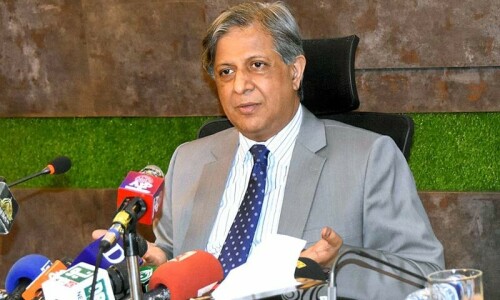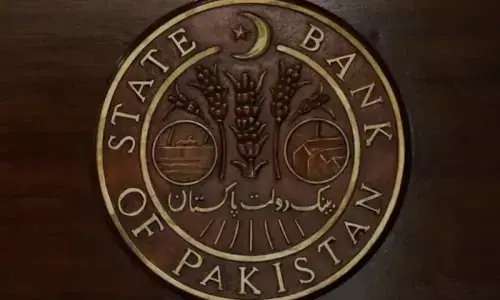PAKISTAN voted on Feb 8 in an election full of surprises and upsets. This was a pivotal poll in the backdrop of the political tensions and uncertainty of recent years, which left the country in a polarised and unstable state.
A lacklustre campaign didn’t discourage people from showing up at the ballot box in greater numbers than predicted. This was testimony to their stake in the democratic process, indicating they felt their vote mattered. The turnout defied the narrative that the election outcome was a forgone conclusion. When results were in, it became clear that this narrative had overlooked electoral dynamics and public sentiment on the ground.
The Election Commission of Pakistan did not cover itself in glory by its inexplicable tardiness in announcing election results. Despite its claim that it had set up an improved system to announce results, the inordinate delay evoked sharp criticism and allegations of foul play. Internet and mobile network disruptions added to the controversy and earned both ECP and the caretaker government justified criticism. PTI leaders claimed “winning seats had been turned into defeats”. Several Western states urged investigation into poll irregularities.
Voters delivered a divided mandate and hung parliament. Results from 265 national constituencies showed PTI-backed candidates winning the most seats, followed by PML-N and then PPP. PTI candidates swept KP and made a strong showing in Punjab.
PML-N’s wins were mostly in Punjab, while the PPP held on to its traditional stronghold of Sindh, also securing seats in Balochistan. PTI’s performance in the face of curbs, denial of its election symbol and with all its top leaders in jail showed that a sympathy wave and determined voting by supporters carried its candidates across the finish line.
Both PML-N and PTI leaders declared victory and claimed they were the single, largest party or bloc in the National Assembly. But neither won a simple majority which left no party in a position to form a government on its own. This makes government formation an imposing task, which will involve tough and protracted bargaining and political horse-trading. This, of course, is not new. Pakistan has long had coalition governments, and that era is far from coming to a close.
Pakistan has voted for democracy but healing and reconciliation are needed for stability.
The question is how long government formation can take even if PML-N, with the pre-election alliances it forged with smaller parties, is in the best position to do so. The poor performance of Istehkam-i-Pakistan Party and JUI-F adds to its difficulties. On the other hand, PTI-backed candidates face the challenge of remaining a cohesive group as efforts will be made for them to switch sides and join a PML-N-led coalition.
PPP had said earlier it will reach out to independents but the numbers do not suggest it can cobble a coalition together. For a PML-N-PPP coalition to emerge, which Nawaz Sharif is now working for, the hostility between the two parties has to be overcome. In a conciliatory speech, Sharif has also indicated willingness to reach out to ‘independents’.
How the 70 reserved seats are allocated will play a key part. They are supposed to be distributed in proportion to the total general seats won by parties. Not being recognised as a political party will deprive PTI of any of these and create an anomalous situation where reserved women and minority seats will simply be distributed among other parties, augmenting their numbers ‘artificially’.
Whoever is able to form the government will face several daunting challenges. The most important is dealing with an economy that is still in the critical ward. Soaring inflation has fuelled a cost-of-living crisis, which has played into the election, with PML-N’s inability to secure a majority partly attributable to the burden of incumbency given its record in the PDM government it led until last August. The next government will have to expeditiously negotiate a fresh, extended programme with the IMF as the stand-by arrangement will end in March. This is urgently needed for Pakistan to meet its heavy foreign debt liabilities in the years ahead.
But a weak coalition government will dampen the prospects of wide-ranging economic reforms that Pakistan desperately needs to put it on the trajectory of sustainable growth and investment. If the next government is a minority one, dependent for survival on appeasing a motley group of parties, will it be able to take tough and politically painful decisions to extricate the country from the economic crisis?
The fall in share prices on the stock market and weakening in Pakistan’s sovereign dollar bonds in the wake of the election reflected uncertainty about the prospects of political stability and meaningful economic reform.
The political challenge will be no less demanding. Whoever forms the government will face a numerically strong opposition in the National Assembly. That will make legislative work an onerous task apart from having to deal with what is expected to be a noisy parliament. Moreover, with the country so divided and polarisation reinforced by the election, this too has implications for the incoming government.
The regionalised nature of the election result in the provincial assemblies will be another challenge for the government at the centre. With the PPP running the Sindh government, PTI controlling KP, PML-N forming the Punjab government, the federal government will face the test of managing the country when three of the four provinces are governed by different political parties, at loggerheads with each other.
The next government will also have to deal with the challenge of establishing smooth and stable relations with the military which in recent years has acquired a much larger role in politics and governance, even in economic and investment matters. The state of civil-military relations could be a key factor that determines the longevity of the coalition arrangement.
An election that people hoped would deliver political stability has ended up creating a host of uncertainties and issues of legitimacy. The country is in dire need of stability that can only be established by a process of reconciliation and healing. Voters see democracy as the best path to achieve stability. But the question is whether the country’s leaders can live up to the challenge of working democracy in the public interest and not just their own. n
The writer is a former ambassador to the US, UK and UN.
Published in Dawn, February 12th, 2024

































